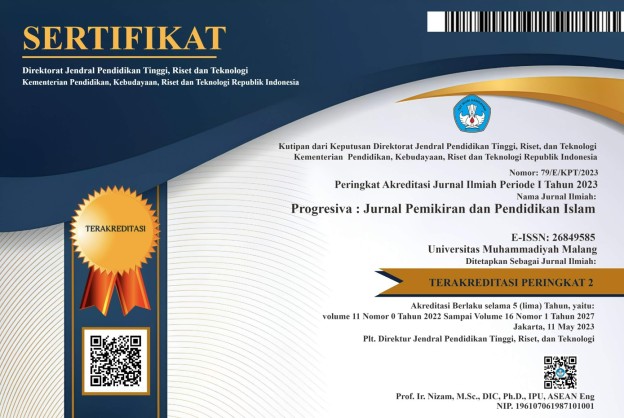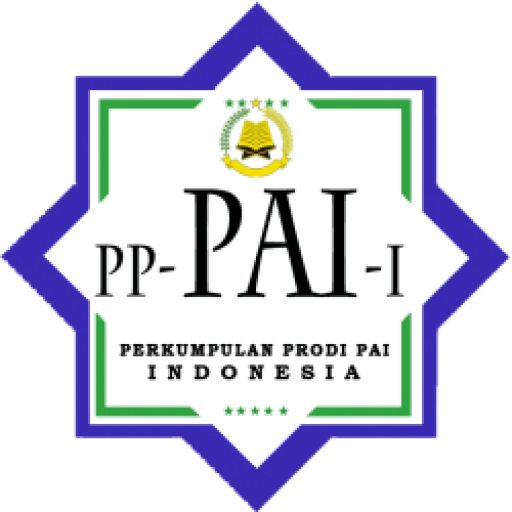Exploring Diagnostic Assesment as an Instrumen for Learning Improvement
DOI:
https://doi.org/10.22219/progresiva.v12i01.25353Keywords:
Diagnostic; assessment; learningAbstract
This study aims to diagnose assessment as one of the learning improvement instruments. Assessment or assessment is a very urgent part of learning activities. From the diagnostic results, it is stated that the assessment has a positive impact on learning. One form of assessment that is often used is formative assessment. This research was conducted with a quantitative approach. Data collection techniques were carried out by questionnaires, interviews, and documentation. Questionnaires were distributed via google form using a liket scale. The research was conducted at madrasas within the scope of the East Java region. The number of respondents consisted of ninety students. The results showed that diagnostic assessment as a learning improvement instrument that was integrated with PAI was very effective in increasing the motivation of madrasa students. Diagnostic assessment also has a positive effect on learning awareness. Diagnostic assessment gives a positive response to learning tools or learning media. Diagnostic assessment has a positive influence on the innovation of madrasa students.
Downloads
References
Adachi, C., Tai, J. H.-M., & Dawson, P. (2018). Academics’ perceptions of the benefits and challenges of self and peer assessment in higher education. Assessment & Evaluation in Higher Education, 43(2), 294–306. https://doi.org/10.1080/02602938.2017.1339775
Alonzo, A. C. (2018). An argument for formative assessment with science learning progressions. Applied Measurement in Education, 31(2), 104–112. https://doi.org/10.1080/08957347.2017.1408630
Barker, D. (1988). DIAGNOSTIC TESTS AND EXAMINATION RESULTS. Assessment & Evaluation in Higher Education, 13(1), 1–15. https://doi.org/10.1080/0260293880130101
BOOK REVIEWS. (2006). Assessment & Evaluation in Higher Education, 31(4), 479–483. https://doi.org/10.1080/02602930600679258
Burdick, A., & Willis, H. (2011). Digital learning, digital scholarship and design thinking. Interpreting Design Thinking, 32(6), 546–556. https://doi.org/10.1016/j.destud.2011.07.005
Carrillo-de-la-Peña, M. T., Baillès, E., Caseras, X., Martínez, À., Ortet, G., & Pérez, J. (2009a). Formative assessment and academic achievement in pre-graduate students of health sciences. Advances in Health Sciences Education, 14(1), 61–67. https://doi.org/10.1007/s10459-007-9086-y
Carrillo-de-la-Peña, M. T., Baillès, E., Caseras, X., Martínez, À., Ortet, G., & Pérez, J. (2009b). Formative assessment and academic achievement in pre-graduate students of health sciences. Advances in Health Sciences Education, 14(1), 61–67. https://doi.org/10.1007/s10459-007-9086-y
Conderman, G., Pinter, E., & Young, N. (2020). Formative Assessment Methods for Middle Level Classrooms. The Clearing House: A Journal of Educational Strategies, Issues and Ideas, 93(5), 233–240. https://doi.org/10.1080/00098655.2020.1778615
Falchikov, N. (2013). Improving Assessment through Student Involvement (0 ed.). Routledge. https://doi.org/10.4324/9780203220993
Gilles, J., Detroz, P., & Blais, J. (2011). An international online survey of the practices and perceptions of higher education professors with respect to the assessment of learning in the classroom. Assessment & Evaluation in Higher Education, 36(6), 719–733. https://doi.org/10.1080/02602938.2010.484880
Huang, Y.-M., Huang, S.-H., & Wu, T.-T. (2014). Embedding diagnostic mechanisms in a digital game for learning mathematics. Educational Technology Research and Development, 62(2), 187–207. https://doi.org/10.1007/s11423-013-9315-4
Husk, S. (2014). The changeling soldier.
Kruit, P., Oostdam, R., van den Berg, E., & Schuitema, J. (2020a). Performance Assessment as a Diagnostic Tool for Science Teachers. Research in Science Education, 50(3), 1093–1117. https://doi.org/10.1007/s11165-018-9724-9
Kruit, P., Oostdam, R., van den Berg, E., & Schuitema, J. (2020b). Performance Assessment as a Diagnostic Tool for Science Teachers. Research in Science Education, 50(3), 1093–1117. https://doi.org/10.1007/s11165-018-9724-9
Leenknecht, M., Wijnia, L., Köhlen, M., Fryer, L., Rikers, R., & Loyens, S. (2021). Formative assessment as practice: The role of students’ motivation. Assessment & Evaluation in Higher Education, 46(2), 236–255. https://doi.org/10.1080/02602938.2020.1765228
Regmi, K. D. (2017). Habermas, lifeworld and rationality: Towards a comprehensive model of lifelong learning. International Journal of Lifelong Education, 36(6), 679–695. https://doi.org/10.1080/02601370.2017.1377776
Struyven, K., Dochy, F., & Janssens, S. (2005). Students’ perceptions about evaluation and assessment in higher education: A review1. Assessment & Evaluation in Higher Education, 30(4), 325–341. https://doi.org/10.1080/02602930500099102
Tan Geok Shim, G., Shakawi, A. M. H. A., & Azizan, F. L. (2017). Relationship between Students’ Diagnostic Assessment and Achievement in a Pre-University Mathematics Course. Journal of Education and Learning, 6(4), 364. https://doi.org/10.5539/jel.v6n4p364
Tang, F., & Zhan, P. (2021). Does Diagnostic Feedback Promote Learning? Evidence From a Longitudinal Cognitive Diagnostic Assessment. AERA Open, 7, 233285842110608. https://doi.org/10.1177/23328584211060804
Voinea, L. (2018). FORMATIVE ASSESSMENT AS ASSESSMENT FOR LEARNING DEVELOPMENT. Revista de Pedagogie - Journal of Pedagogy, LXVI(1), 7–23. https://doi.org/10.26755/RevPed/2018.1/7
Werang, B. R. (2018). Pengaruh Keterampilan Managerial Kepala Sekolah dan Iklim Sekolah Terhadap Komitmen Kerja Guru Sekolah Dasar Kristen di Kabupaten Boven Digoel. Al Ibtida: Jurnal Pendidikan Guru MI, 5(2), 159. https://doi.org/10.24235/al.ibtida.snj.v5i2.2650
Weurlander, M., Söderberg, M., Scheja, M., Hult, H., & Wernerson, A. (2012). Exploring formative assessment as a tool for learning: Students’ experiences of different methods of formative assessment. Assessment & Evaluation in Higher Education, 37(6), 747–760. https://doi.org/10.1080/02602938.2011.572153
William, D. (2011). FORMATIVE ASSESSMENT: DEFINITIONS AND RELATIONSHIPS Dylan Wiliam, Institute of Education, University of London. Assessment for Learning: Origins and Antecedents For, 1–26.
Yang, X., & Embretson, S. E. (2007). Construct Validity and Cognitive Diagnostic Assessment. In J. Leighton & M. Gierl (Eds.), Cognitive Diagnostic Assessment for Education (pp. 119–145). Cambridge University Press. https://doi.org/10.1017/CBO9780511611186.005
Yorke, M. (2003). Formative assessment in higher education: Moves towards theory and the enhancement of pedagogic practice. Higher Education, 45(4), 477–501. https://doi.org/10.1023/A:1023967026413
Downloads
Published
How to Cite
Issue
Section
License
Copyright (c) 2023 Mukhammad Bakhruddin, Sugito Muzaqi, Kusaeri; Lailah Isrofatun Nahdiah; Mirwan Ahmad Taufiq

This work is licensed under a Creative Commons Attribution-ShareAlike 4.0 International License.


















